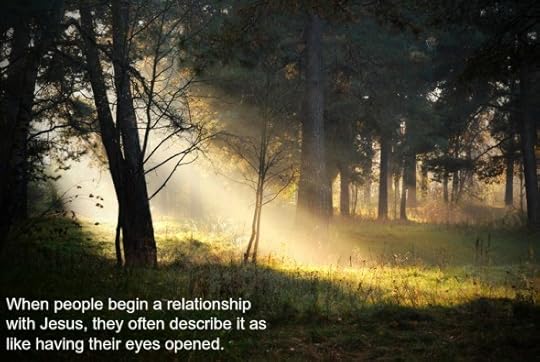Will Davis Jr.'s Blog, page 6
April 28, 2016
Four Ways to Respond to the New Atheists
So, we need to get on the solution side of this problem.
I’ve spent the past two days talking about the appeal of atheism to many young men who have rejected the concept of any ultimate reality, but who are still looking for some philosophy with which to identify. Curiously, their belief in no absolute reality leads them to the very absolutist worldview of atheism.
But as I have shared in my preceding two posts, the attraction of atheism has very little to do with the inarguable evidence against the existence of God, as no such evidence exists. Rather, the appeal for the new atheist is a universe of which they get to be the center.
The new atheism gives angry young men the platform from which rage against all the evils of God and religion without requiring them to face the ugly reality of why they are so angry in the first place. That said, we as Christians have a biblical duty to not only minister, but to love this new brand of rather prickly unbeliever.
Atheists, even the militant kind, are not our enemies, and we would do well to remember that when interacting with them. Thus, I suggest the following four principles for dealing with the new atheists.
Understand the seriousness of their posture before God.
This is not a game.
Too many Christians approach their dealings (or lack thereof) with atheists with a flippancy that borders on irresponsibly. We need to remind ourselves of the perilous posture before God that those who rage against him have placed themselves.
The Bible calls those who reject God “fools.” The word doesn’t mean stupid or unlearned, it means arrogant and irresponsible. Atheists today are the modern day equivalent of the “God-haters” described in Romans 1:30. And friends, no matter how much you may dislike someone and how spiteful they may be to you, you don’t want ANYONE standing before God with the label of “God-hater” attached to them.
Atheists are not some odd phenomenon in our culture that we have to put up with until we get to Heaven. Neither are they a throwaway breed of human that is beyond the reach of God. They are people for whom Jesus died who currently stand under the condemnation of God (John 3:18). And, they are one skipped heartbeat away from spending an eternity in a Hell created only for Satan and his demonic horde.
Humans were never intended for Hell, but it is the unfortunate final place of justice for those who reject God’s repeated overtures in life for them to surrender to his will. That reality terrifies me, and it should you as well.
We need to remind ourselves that atheism isn’t a stage or a cultural trend that some just fall into. It is life without God that can only lead to one horrible outcome–eternity without him as well.
Don’t debate them.
The new atheists love a good debate. They love the attention and being someone’s project, they love playing the role of the contrarian thinker, even if their stance that there is no God is complete lunacy (that’s part of the appeal). And it gives them the chance to look really smart by spouting the latest talking points from their favorite atheist web sites.
My advice to you is don’t debate them. Unless you find a genuinely struggling and open-minded atheist, like the kind I mentioned in Tuesday’s blog who attend my church on occasion, you need to know that the guy you’re arguing with thinks this is all a big game. He has no intention of hearing what you have to say. He’s only thinking of how he can outargue you and thus prove to be the superior intellect.
Beyond that, Jesus established preaching and proclaiming, not debating, as the means by which he would spread his message. We are not called to debate the Gospel with the lost, but rather proclaim it to them.
It will be your steadfastness and strength of your belief in the Gospel that might influence the atheist in your life, not your ability to outargue him.
Pray for their healing.
My overarching thesis for these posts is that there are very few true atheists in the world, just people who are mad at God.
Even a cursory study of the lives of the most outspoken atheists, both past and present, reveals a heartbreaking pattern of suffering and great loss, often at the hands of their own fathers. Bottom line: the God they experienced or the God that was represented to them or the things done to them in the name of God gave them all of God they wanted.
Again, science doesn’t initially woo most atheists. Incongruities with what they expect or hope God to be is what woos them. Science is the place atheists run to, but they are always running from something.
The pain and disappointment atheists have experienced doesn’t give them a pass for the accountability we all have before God or for the venom many of them spew against him and his people. But, it does explain some of what’s behind their anger.
And that anger, by the way, is nothing a good argument can fix. Our friends in the atheist world need healing. Actually, that’s not true, we all need healing.
The way I can best serve the atheist men and women I know is to pray for God to woo them to himself, to heal them and to set them free from what binds them. Because as in the case of any person who needs God, it will eventually be the woo of God that wins them over.
And finally, never stop loving them.
Let me end where I began: atheists are not our enemies. We do not have permission to respond to them with anything less than love. That doesn’t mean that we are silent in the face of the attacks or that we don’t respond to them with passionate and reasonable answers, but we do not get to hate them.
And honestly, no serious Jesus-follower wants to.

April 27, 2016
Seven Advantages of Being an Atheist, Part 2
Thanks for reading this.
I want to continue today with four more “advantages” of being an atheist. These are some of the real reasons–be they conscious or subconscious–that so many find atheism an attractive option to belief in God. Here we go:
Atheists get to blame God for everything.
This is a favorite of atheists these days. If the God of the Bible exists, they reason, then he is mean, vindictive, enjoys killing the innocent, is vain, self-centered and on his best days, confusing and contradictory. He becomes the perfect scapegoat for everything from cancer to droughts to floods to war to oppression to prejudice to ethnic cleansing to a bad economy.
This is actually an interesting argument, as it is less an argument against God and more an argument against a God that atheists can’t stomach. It reveals God as one the atheists don’t like, don’t approve of or don’t want to exist, simply because they don’t agree with what he does.
But God’s supposed bad behavior isn’t an argument against his existence, but rather an argument for his not meeting certain standards. In the chilling words of Romans 1, they put God to the test for the purpose of approving Him should He meet their specifications, and finding that He did not, they disapproved of holding Him in their full and precise knowledge.
In other words, they wrote God off because he didn’t meet their preconceived expectations of what they think God should be. Such a posture before God is one of unbelievable arrogance, and one that is quite normal for today’s new atheist.
Atheists get to appear to be very compassionate and concerned about the poor “victims of God and religion” in the world. In truth, most are not concerned about them. But atheism gives them the bully pulpit to rage against God and sound very righteous in the process.
Atheists get to ignore those who are in need around them.
There is no moral imperative by which an atheist feels obligated to care for the poor or “least of these” around him. And while atheists are quite capable of being compassionate and others-centered people, they typically are not. They have no reason to be.
 The militant atheist crowd is busy about attacking those pesky manger scenes that pop up every Christmas and threatening high school students who want to pray before football games. But you’ll find they have very little zeal for housing the homeless, serving people and families with special needs, digging wells in third world countries, reversing illiteracy, adopting unwanted children, and addressing the critical issues of the world with compassion, manpower and money–all things the church has been doing for centuries.
The militant atheist crowd is busy about attacking those pesky manger scenes that pop up every Christmas and threatening high school students who want to pray before football games. But you’ll find they have very little zeal for housing the homeless, serving people and families with special needs, digging wells in third world countries, reversing illiteracy, adopting unwanted children, and addressing the critical issues of the world with compassion, manpower and money–all things the church has been doing for centuries.
Atheism is popular because it gives people permission to gripe about things, blame others in the process, and still do nothing about them.
Atheists get to do anything they want.
Atheists have no reason to behave themselves. Other that what little societal pressure and responsibility they may recognize, atheists don’t need to feel accountable to anyone.
There is certainly no eternal Judge to whom they must answer, no justice waiting for them in the afterlife, and no sense of moral consciousness here on earth, so things like lying, judging, slander and most importantly, hating, all are fair game.
The point I made in yesterday’s entry drives this: self is at the center of the atheist’s worldview. And a world filled with people living for themselves is not a pretty place to be.
Finally, atheists get to ignore what’s really going on.
This is the point I will develop further tomorrow, as I offer some suggestions for how to pray for, care for and love these new atheists.
Very few atheists claim their worldview because they have rationally followed the evidence and come to the obvious conclusion that God isn’t real. Such a line of evidence doesn’t exist. Even though they claim to be people of reason, reason is not what drove them to their unbelief. Circumstances did, and bad circumstances at that.
Show me a militant young atheist and I’ll show you a guy with a story. The stories typically involve great disappointment in or pain caused by his earthly father, significant abuse at the hands of a spiritual leader, or unbelievable suffering and loss in his formative years.
Atheism gives guys like that, guys with very difficult stories, a way out. For rather than having to believe in a God who would allow such things to happen, they can simply choose to write him off entirely. Their raging against God and the Church gives them the ability to stay just ahead of the hounds of pain and the ugly realities that are ever nipping at their heels.
That’s I why contend that there are very few true atheists in the world. Just people who are mad at God.
More tomorrow.

April 26, 2016
Seven Advantages of Being an Atheist
What runs below may initially appear to be a rant. It’s not, or at least it’s not intended to be. I plan to spend the next few days talking about atheism and its growing appeal to young men, especially Millennials. I hope you will stay with me to the end (Thursday) where I intend to get very practical in suggesting how and why we should engage this new Atheism. Thanks, Will Davis Jr
I read another account recently of a supposedly “Christian” musician who had seen the light and (converted? reverted? switched over?) to atheism. He reportedly had grown weary of “believing a lie” and had decided to “embrace reason” and admit to himself that there was no God.
That is, curiously, an increasingly popular thing to day these days.
I’ve also been reading a book about the life of a world-renown atheist author. It has been fascinating, very enlightening and one that I’m sure I’ll recommend to you in the future.
For today’s purposes, I’d like to shed a little light on why so many, especially young men who are Millennials, appear to be rejecting God and becoming rather outspoken in their atheism.
Now by way of qualifying, I am NOT talking about most of the men I would consider friends, some who occasionally attend my church, who would put themselves in the atheist or agnostic category. These are humble men who really struggle with their inability to move in the realm of faith, who wrestle with what they believe to be serious conflicts between what the Bible says and what science proves, and men who readily acknowledge the obvious disconnect with the fact that that they have no problem with their family members being Christians.
I am NOT talking below about those guys.
I remember telling atheist leader David Silverman that he and his militant buddies were giving true atheists a bad name. Because the atheists that I know are nothing like Silverman and his hit squad of thugs who seek to impose their worldview on everyone else and silence those who choose to believe.
But there is a new brand of atheism emerging, and one that is quite attractive to many young men.
Here’s why.
Atheism gives you permission to be selfish and self-centered.
Atheists have no reason to put others before themselves. Atheists and their buddies the humanists and the naturalists happily admit that self is at the center of their world view. Why wouldn’t it be? With no life beyond this one, no God to answer to and Darwinism’s “survival of the fittest” driving them to stay ahead of the evolutionary curve, why wouldn’t they put themselves at the center of their world?
Atheism gets you lots of attention, especially from Christians.
One great way to find yourself at the center of everyone’s attention is to simply start saying that you no longer believe in God. Suddenly you’re everyone’s favorite project. People — family, friends, pastors and even complete strangers — suddenly are trying to convert you. Others just want to debate you.
And atheists, many of whom have no intention of seriously considering the other side, love the attention. For them, playing the contrarian is part of the fun of being an atheist. It’s almost like a game to them.
A few years ago an atheist leader asked me to help him find a church in which to shoot a promotional video for his movement. When I declined to help him and told him that no pastor I knew would either, he seemed genuinely hurt. It was like this was all one big friendly game to him, not a spiritual struggle with eternally high stakes.
But the fact remains, if you want to get a lot of attention, just start talking about your lack of faith.
Atheists get to claim to be smarter than everyone else.
I mentioned above that the “Christian” artist had decided to “embrace reason” and reject God. It’s like he took the phrase right off of an atheist web site.
The “we’re reasonable, you’re not,” “we refuse to believe fairytales,” and “thinking people don’t need God,” mantras have been favorites of militant atheists for years. And when you add to that the cultural perception and constant media blitz that says science, philosophy and academics have all proven that God is a figment of weak people’s imaginations and that really smart people refuse to buy the ruse, then who wouldn’t want to side with that crowd?
And even though any atheist who is indeed a thinker knows full well that there are many passionate followers of Jesus who are highly respected in the aforementioned disciplines, who neither checked their brains at the door of their church nor their faith at the door of their respective lab, classroom or library, they still act as if the thinking man’s disciplines belong to those who have rejected the foolish notion of the divine.
Atheists love to play the card that they are smarter than everyone else. And if you’re a young man looking for a group with whom to identify, and you have no real loyalty to church or faith, then what wouldn’t be attractive about joining up with those who claim to be the intellectual elite?
There are several other “advantages” to being an atheist that I will list tomorrow. But for today, do you see the theme developing that today’s new atheism has very little to do with the conviction that there is no God?
Hasta manana. In the meantime, I welcome your comments.

April 25, 2016
Dear New Believer: When Eternal Life Begins
Good Morning Friend, I pray you are well.
Jesus answered, “Truly, truly, I say to you, unless one is born of water and the Spirit he cannot enter into the kingdom of God.” John 3:5
A common theme in New Testament theology is not only the difference between spiritual and physical realities, but also the superiority of the former to the latter.
In this unusual statement to Nicodemus, Jesus was acknowledging that difference. His reference to being born of water is most likely a metaphor for physical birth. The image recalls the breaking of the water in a mother’s womb before a child is born.
Jesus sets apart physical birth from the spiritual birth that happens when a person’s spirit is born anew, or born from above. And notice that it’s only the second birth—the spiritual one—that grants a person access to the Kingdom of God.
Because God’s Kingdom is spiritual in nature, it can only be accessed by spiritual means. No amount of money or power or influence can gain an individual access to God’s Kingdom.
Another way of looking at this is that Kingdom citizens have two birthdays — one for the beginning of their physical life and one for the beginning of their spiritual life. And it’s that second one — that spiritual starting point — that also marks the beginning of a person’s eternal life.
Now there’s something you can chew on today: eternal life doesn’t begin when you die, it begins when you believe! And friend, yours has started. Wow.

April 21, 2016
I’m Embarrassed to Admit this, but . . . .
Years ago, when I was going to school and leading a small church in Fort Worth, I started a prayer ministry in our church. It was called the Swollen Knees Prayer Ministry. A buddy of mine had visited our church and preached about how prayer warriors should have swollen knees. I thought it was cool and stole the name for our new ministry.
The Swollen Knees Prayer Ministry—pretty warm and fuzzy, huh? The goal of the ministry was to cover all 168 hours of the week in prayer, with each participant taking at least one hour. Given that we barely had 168 adults in the church, that was a pretty ambitious goal.
Being the godly, sacrificial pastor that I was (and as a legalist, believing that if prayer didn’t hurt it didn’t count), I took Saturday mornings from 2-3 AM. I used to set my alarm for 1:50 AM, take the relay call from the 1-2 AM person, and then try to pray from 2-3.
We had a prayer script for people to follow, and I would sleepily work my way through that. Then I’d call the 3-4 AM person and fall back into bed. It was a really tough hour to pray. But because it was so hard, I knew it had to be effective. I also knew that I was a very spiritual person because I prayed from 2-3 AM. Right?
My wife Susie wasn’t quite so spiritual. She took the 8-9 PM Saturday night shift. I mean, what gives? Where’s the sacrifice? Where’s the commitment? Anyone can pray at eight in the evening. And to make matters worse, she had fun doing it.
I remember walking in to our back room one Saturday night during Susie’s allotted prayer time. She was riding our Scwhinn exercise bike with her headphones on. She was singing and waving her hands in the air and smiling. Smiling? Are you serious? You can’t smile during prayer. She had her prayer script nearby, but it was obvious she wasn’t using it.
I couldn’t believe it. My own wife was cheating at prayer. I pointed a mean, accusatory finger at Susie and yelled, “That doesn’t count!”
We’re still paying that counseling bill.
That’s just one example of the extreme legalism that dominated my adult spiritual life for over a decade. And as the story reveals, legalism doesn’t just steal your joy, it crushes the joy of others as you try to impose your own impossible standards on them.
This is why Paul exhorted Timothy to “be strong in grace,” 2 Tim 2:1. Because if we don’t fight for grace, the ever-present pull of rule-keeping and external measurements will eventually rule the day.
The happy ending to this story is that God used the school of hard knocks and my own failures to show me just how futile my legalism really was. And while it was a hard lesson for me to learn, I’m really grateful to have learned it.
I’ve never felt freer in my relationship with Jesus.
Don’t let rules and regulations define your relationship with God. Remember what Paul said, “It was for freedom that Christ set us free; therefore keep standing firm and do not be subject again to a yoke of slavery.” Galatians 5:1

April 20, 2016
Dear New Believer: On Seeing God’s Kingdom
Letters to New Believers are from actual emails I’m sending to a friend who has recently chosen to follow Christ. I will occasionally share some of them here.
Dear New Believer:
Jesus answered and said to him, “Truly, truly, I say to you, unless one is born again he cannot see the kingdom of God.” John 3:3
When Jesus told Nicodemus that he needed to be born again, he was implying several things about his (Nic’s) spiritual condition. One thing Jesus was suggesting was that Nicodemus was spiritually blind.
“Unless you’re born again, you can’t see God’s Kingdom” (John 3:3).
Nicodemus was a world-class religious leader and a very devout and upright man, but he was still spiritually blind. He was simply unable to see what others all around him could.
When people begin a relationship with Jesus, they often describe it as like having their eyes opened. Suddenly they are aware of realities—spiritual realities—that previously eluded them. What’s going on? They’re seeing the Kingdom.
God’s Kingdom is all around us. It’s not bound by any geographic boundaries and knows no political or cultural limits. But it’s only visible to those who are born again.
When God’s touched your spirit, besides becoming a completely new creation (something we’ll discuss in the future), you gained access to and insight into God’s Kingdom. You became part of the rule and reign of God in the world today. And as you develop your Kingdom vision, you’ll begin to see things completely differently.

April 19, 2016
Three Ways to Make the Most of 30 Second Encounters
We have them all the time. I call them thirty second encounters.
You know what I’m talking about: the conversation on the elevator with guy you see every day who works in your building, the brief exchange with the teen working the check-out line at the grocery, the regular chat with your pharmacist, the lady you see three times a week when you work out, your weekly conversations with your yard guy.
I spent two days last week in the hospital recovering from a partial knee replacement. I had dozens of thirty second encounters while I was there.
A thirty second encounter is nothing more than a spontaneous meeting between you and another person — it could be someone you see regularly or a complete stranger — that lasts a minute or less. But a thirty second encounter is more than just a random meeting between two people; it’s an eternal opportunity.
You don’t need to have a long and involved conversation with someone to impact them. Thirty seconds is more than enough to point the crossing guard at your kid’s school toward eternal realities.
Here are three things I do in my thirty second encounters to encourage people. I’d love to know what you do as well.
I splash Jesus on them.
Jesus told us that if we drink from him, rivers of living water would flow out of us. (See John 7:37-39.) Whenever I have a brief encounter with someone, I try to picture Jesus splashing all over them. I want to be so wet with the Spirit of Jesus that everyone I meet gets wet, too.
The Scriptures teach that it is actually Jesus who lives in and through us. That being true, when someone meets you or me they’re actually meeting Jesus in us. It’s our job to make sure they get a good picture of him.
Unbelievers are more spiritually intuitive that we realize. They know when something is really different about someone.
If you splash Jesus on them (read: treat them, speak to them and love them as Jesus would), they’ll know something is up.
I tell them they’re loved.
This one has become a favorite of mine. I tell people how loved they are. It always surprises them.
People aren’t used to being told that they’re loved in those everyday, drive-by encounters. Some people are never told that they’re loved, even in their family settings, much less in the rough-and-tumble world we live in. So I can promise you that it really gets the pizza delivery guy’s attention when you end your encounter by asking, “Do you know how loved you are today?”
I always make it a question, because it invites a response. And sometimes those responses can lead to some amazing conversations.
I pray for them.
I don’t mean that I pray with them, as that might be more than they can handle in a thirty second encounter. I mean that I talk to God about them, even while I’m with them.
I find myself breathing little prayers as I try to splash Jesus on people. I want them to know how loved they are and I pray that God might overwhelm them with his goodness and mercy. Sometimes I see people moved to tears while I’m talking to them, and I know God is answering my prayers.
Silently praying for people while you’re with them can have a major impact on the nature and direction of your conversation. It can also leave a lasting impression. After a thirty second encounter, I want the person I’ve been with to feel different, to feel blessed. I want to leave Jesus behind with them. Praying for them invites God’s Spirit to linger with them long after I’m gone.
So as you can see, having significant impact in a person’s life in just thirty seconds isn’t as difficult as it first may sound.
What about you? Would you share your own strategies for leaving Jesus behind after you’re gone?

April 13, 2016
A Room with a View: Jesus Talks about Heaven
Jesus, the world’s most influential religious leader, talked at length about Heaven. That should come as no surprise. Neither is it surprising that he had rather unconventional things to say about Heaven.
By now you have probably figured out that whatever the major theological emphasis in religion was, Jesus would somehow connect himself to it. Heaven was no exception. Jesus affirmed the idea of a spiritual place where God’s people would spend eternity. But Jesus went much further with his view of Heaven.
To Jesus, Heaven was being with him. It was unencumbered fellowship and interaction with him in the realm where he was most at home — God’s unrestricted presence.
In the hours before his arrest, Jesus gave some important final instructions to his remaining disciples. The teaching is found in John, chapters 13-16, and it is known among Bible scholars as the Farewell Discourse. In it, Jesus used the promise of Heaven to comfort his followers in the face of all that was to come.
He said, “Do not let your hearts be troubled. Trust in God; trust also in me. In my Father’s house are many rooms; if it were not so, I would have told you. I am going there to prepare a place for you. And if I go and prepare a place for you, I will come back and take you to be with me that you also may be where I am” (John 14:1–3).
This is one of the most popular and frequently used biblical texts at funerals, and it is easy to see why. Let me sum up what Jesus said here about Heaven:
It is real; it really does exist.
Its reality should help keep our hearts from being troubled.
It is the place where his Father (God) lives; it is his Father’s house.
It is large and roomy, and it has many individual rooms for guests. You will never find a No Vacancy sign out front.
Jesus is Heaven’s advance man; he is there right now getting your room ready for your special arrival.
Jesus is Heaven’s chauffeur. When it is time, he will come and personally escort you to your new home.
Jesus is Heaven’s main attraction. Heaven, to Jesus, is all about getting to be with him on his home turf.
You can believe everything that Jesus says about Heaven, because trusting him is the same as trusting God.
Intrigued? If I walked up to you and started boasting about my access to and rank in such places as the White House, NASA’s mission control, or the strategic defense bunkers buried in the hills outside of Colorado Springs, you would probably think that I had fallen off my bike a few times too many.
Well, that is basically what Jesus did; only the place he claimed to have access to was none other than God’s living room.
To Jesus, not only are you incomplete without Heaven, but Heaven is also equally incomplete without you. So much so that not only did God send his Son to die for the sins that would keep you out of Heaven; but when you believe in Jesus, and when it is time for your life in Heaven to begin, God will also send Jesus to earth to personally collect your living soul and see you safely to his Father’s house.
From A Man Who Told Us the Truth, Chapter 7, Heaven’s Chauffeur–The Truth about Death and Heaven.

April 12, 2016
And the Ultimate Love Language of Marriage is . . . .
One of the best books ever written on marriage is The Five Love Languages by Gary Chapman. Chapman helps readers understand what behaviors or words make them feel loved in marriage as well as showing them what makes their spouse feel loved.
It’s an extremely helpful book and I heartily recommend it.
There is, however, another marriage love language that trumps all others. It’s the love language that God expects in marriage and requires for both spouses.
So what’s the ultimate love language of marriage?
It’s sacrifice.
That which God expects of all spouses is the willingness to sacrifice for the well being of the other. It’s summed up in Paul’s short but powerful transition statement in Ephesians 5 — the one between his teaching on the filling of the Spirit and its effects on human relationships, starting with marriage.
“And be subject to one another in the fear of Christ,” Ephesians 5:21.
Consider Psalm 50:5, too — “Gather My godly ones to Me, those who have made a covenant with Me by sacrifice.“
The language of covenant in the Bible is sacrifice. The sacrifice of a covenant maker showed how serious he was about the agreement he was entering into.
God used the sacrifice of animals when he made covenants with individuals in the Old Testament. Then, in the ultimate covenant act, God sacrificed his Son for us. That act of covenant showed just how serious God was about redeeming us from sin. He backed it up with the death of Jesus.
In the New Testament, Paul used God’s covenant with us to describe how a Christ-honoring marriage is supposed to work. He used the two players in God’s covenant relationship — Jesus and the Church — to show husbands and wives respectively how they are to not only act in marriage, but also how they are to treat each other.
In a word, it’s sacrifice.
Husbands sacrifice by dying daily for their wives. They lay their own lives down in order to provide for, protect, serve and lead their wives well. Wives sacrifice by daily living for their husbands. They show them honor by submitting to them and respecting them.
I know that that some of the language I just used for husbands and wives seems more than archaic in our culture. Words like submit, serve and honor. And that may be the point.
How might our marriages be better if husbands and wives approached each other with an “I’m in this to sacrifice” mindset? Would our divorce rates drop? Would cases of infidelity decline? Would marriage joy increase? You can decide for yourself.
But in a world where “Christians” celebrate their divorces on Facebook, I find the Bible’s call to sacrifice as part of the marriage covenant to be quite refreshing.
For those of you who are married, stop and pray about your relationship with your spouse. Where might God be asking you to add sacrifice into the language of your marriage?
For those of you who are single but plan to be married in the future, starting looking today at marriage through the lens of the Scriptures and not the lens of culture. The basic difference is obvious: Biblical marriage asks “What can I give?” not “What can I get?”

April 6, 2016
Dear Pastor, How to Make a No-Win Decision
Last week, I had to make a very tough decision. It was one of those that makes you sick just thinking about it.
Why? Because you know you can’t win. It’s one of those decisions where you’re going to make people mad and have mud on your face no matter what you do.
Now if you’re like me, you work overtime to avoid getting forced into corners where such decisions are even necessary. And about 95% of the time I’m able to rely on the systems we’ve created and/or the great leadership of the people around me to keep us out of the ditch.
But every so often a situation arises that we can neither avoid nor wriggle out of. This was the case last week. Something popped up that I had to handle, and I had to handle it immediately.
If I went with Option A, which was basically to do nothing and let the situation carry on, then I would probably make no one mad but I would be compromising a biblical value that our church has been based on for over twenty years.
If I went with Option B, I would greatly offend people I care about and who were innocent bystanders in the matter. But, our values would be intact.
Can you relate? I’m sure you can. Leaders face such seemingly no-win decisions regularly. And knowing how you’re going to make that decision, knowing what systems will kick-in when you’re faced with a really tough call, will go a long way toward helping you make the right one.
I knew my decision almost immediately: I went with Option B. I chose to displace some people who hadn’t done anything wrong for the sake of the integrity of what I believe to be the bigger picture. I settled for some short-term pain and dissonance over having to deal with the longer-term implications of compromised values.
That’s my formal answer, and it’s very accurate. But there’s another reason I can give for my choosing Option B–it’s the one I can live with.
When you know you’re going to make a tough call, and you know that a compelling case could be made for either side, then I encourage you to go with the decision you can live with the most. If you’re going to disappoint people no matter what you do, then make sure that you don’t disappoint yourself in the process.
The leadership decisions I regret the most, and in some cases are still paying for, are the ones I made when I didn’t follow my gut. I compromised my own convictions and leadership instincts for the sake of consensus or displeasing the fewest number of people.
I’ve made decisions based on my desire to quiet a squeaky wheel, and I’ve regretted it every time.
If you have to make a tough call, then go with the one that you believe in the most. At the end of the day, you have to look yourself in the mirror and live with the consequences of your choice.
I do not regret the decision I made last week. I regret that I had to make it, but I don’t regret the call I made. Yes there has already been pushback and I know more will come. I can live with that.
What I can’t live with is knowing that I compromised my own values and those of the organization I lead in the name of avoiding conflict. That’s never a good call.













